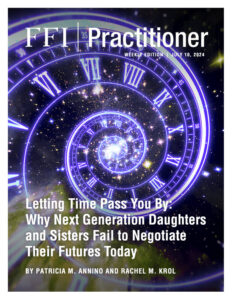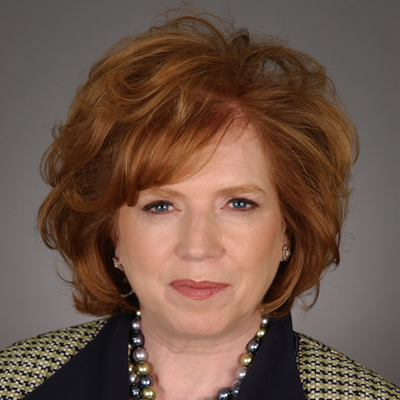
View this edition in our enhanced digital edition format with supporting visual insight and information.
Continuing our quarterly series on the FFI conference theme, “Mean Time: Time, Timing, and Timelessness in Family Enterprise,” we are pleased to feature four issues based on presentations that will be made in London in October. We begin with “Letting Time Pass You By: Why Next Generation Daughters and Sisters Fail to Negotiate Their Futures Today” by Patricia Annino and Rachel Krol.
Future ownership and leadership roles in family enterprises can and should be negotiated by next gen women—but that does not happen as often as it should. Many capable young women are sitting on the sidelines, allowing others to make decisions about their future for them, and letting the passage of time determine their fate with no active planning on their part. As a result, family enterprises are missing out on key talent that either remains untapped or is lost to opportunities outside of the family system. And, as the years go by, promising young women in enterprising families are too often looking back with regret about how things have turned out for them personally.
It takes years to prepare family business leaders, including future board members, active owners, corporate executives, and foundation directors, to name a few. Women in particular need to understand that the path starts early. Why don’t they? Here are twelve common barriers that prevent next gen women from beginning to negotiate their future roles today. To provide wise counsel, any advisor or coach needs to understand which barriers are most active in a particular case and then craft a tailored strategy for overcoming them.
Now is not the time to act because…
- “I’m still young. There’s plenty of time.” That might be true, but this mindset fundamentally underestimates the various types of development and negotiations that are needed to keep the door open for leadership roles in a family enterprise. It overestimates the ability of a family member to flip a switch at some future point. Success in the family enterprise requires continuous attention and effort.
- “I’m not ready to commit yet.” Today’s next generation members have more opportunities outside of the family enterprise than any previous generation. It is more common for professionals to transition regularly between jobs and industries. At the same time, deciding to join the family enterprise can feel like a lifelong commitment (even if it does not have to be). This limiting mindset can delay progress and overlooks the fact that there are still conversations to be had and development opportunities to pursue that do not necessarily require an ironclad commitment to a particular path.
- “I’ll come across as greedy, pushy, ungrateful, etc.” Through societal influence and family cultures, women are taught and expected to be selfless team players. They may fear that expressing an active interest in a leadership role for themselves or taking steps to further their candidacy and potentially compete with siblings or other family members will trigger negative reactions. Research and experience both show that this dynamic does happen. There are gendered differences in the way that people react to women and men who advocate for themselves at work.1 The false assumption women in enterprising families make is that this challenge will lessen as time goes by and that at some vague future point, they will no longer need to contend with it. But in reality, it is a constant (at least for the foreseeable future) that they need to learn to manage.
- “I’ll make [insert name] unhappy.” Sometimes a spouse, sibling, or cousin can feel threatened by assertiveness, commitment to goals, and professional success of others around them. These naysayers can have a powerful impact and impede progress. Family relationships are complex and women in enterprising families often default into roles to caretake, to manage feelings and emotions, and to “keep the peace.” They are hyper-attuned to any changes in relationship dynamics. Succession and changes in leadership naturally cause ripple effects in the system that impact other family members. This focus on the individuals is important, but it cannot get in the way of looking at the system overall: what is best for the entire family to sustain multigenerational success over the long term?
- “I can’t compete against family.” For women, “competing” against siblings or other family members can seem like a dirty word. Yet to claim personal power and actively pursue a leadership opportunity often involves competing with others in the system (in perhaps a collaborative way). Women who want to lead must get comfortable with this dynamic—understand that there might be some bruised egos in the short term, but trust that they can manage relationships over the long term.
- “Our rules say so.” Some families have formal policies and pathways for family members to follow. Others do not. If rules exist, family members should certainly follow them. But, as with any kind of hiring process, there are proactive, informal steps to take to build relationships and show your potential that are not typically set forth explicitly in written policies. Women are more conditioned to follow the letter of the rule than men are.2 When the rules aren’t clear, comprehensive, or implemented consistently, they can serve as a barrier. Women tend to ask permission and not forgiveness, which can cause them to fall behind over time.
- “No one has tapped me yet.” Certainly, others are involved in deciding whether or when a next gen family member is qualified for a particular position. But waiting to be tapped is not a good long-term strategy, particularly early in the process of preparing to enter the pipeline. Advisors should ensure their next gen female clients recognize they may be viewed as being on the sidelines, and others may prepare ahead of them, while others may perceive them as not being motivated enough to lead.
- “The job is mine anyway. Relax.” A sense of entitlement can lead to a fatal delay.
- “My kids/husband/partner/parents need me.” The need to juggle competing priorities and responsibilities is a lifelong challenge. But all too often, the vividness of the short-term pain can lead to longer-term priorities getting overlooked. This barrier illustrates the cognitive challenge of trying to accurately predict what the future will look like, what will make next gen women happy in the future, and what others will still need from them in a few years’ time. Multiple decision-making biases contribute to women tending to make tradeoffs today that do not actually serve their longer-term goals.
- “I just need to keep my head down and work harder.” Or, to put it another way, “I just need to study hard, ace the test, and go for the ‘A.’” This mindset serves women well in the classroom but not in the office or boardroom. The belief that working hard is all it takes to get ahead overlooks the networking and relationship-building factors that are fundamental to success in professional business life generally, and in family enterprises specifically.
- “I wouldn’t even know where to start.” This barrier is one of the easiest for an advisor to help address by providing concrete examples of early actions to take. Success requires spending time outside one’s comfort zone, being a lifetime learner, expressing enthusiasm and curiosity, engaging in conversation with potential mentors and others who will eventually make decisions about the future, and uncovering the skills and tools that clients may not even be aware of that will be fundamentally important for the journey. It is never too early to start.
- “What if I fail? What if I end up in leadership and do not succeed? I do not want other family members’/owners’ financial fortunes to be adversely impacted by my mistakes…” Fear of failure is more likely to hold women back than it is to hold back their brothers and male cousins. This translates into women prematurely screening themselves out of positions. According to one widely cited study, men apply for a job when they meet only 60% of the qualifications, but women apply only if they meet 100% of them.3 What holds women back? A combination of lack of confidence, fear of failure, and a tendency to follow the rules. But let’s frame this another way: women tend to accept roles that they’ve already evolved past. Over time, this slows down their growth and development compared to others who take on more growth or stretch opportunities.To be clear, some of this trepidation is warranted: managers tend to promote men based on potential and women based on a proven track record of success.4 In other words, failure is more accepted in men than women. But, similar to the point made in #3, there is no reason to wait for this bias to change. Instead, women should start equipping themselves today with tools to manage it.
Time matters for all. Chance favors a prepared mind. Preparing to lead takes an investment in time and resources. The sooner strategic preparation begins, the more likely the outcome will be successful.
Notes and References
1 See, e.g., Hannah Riley Bowles and Linda Babcock, “How Can Women Escape the Compensation Negotiation Dilemma?,” Psychology of Women Quarterly 37, no. 1 (March 2013): 80-96, https://doi.org/10.1177/0361684312455524.
2 Mohr, Tara Sophia. “Why Women Don’t Apply for Jobs Unless They’re 100% Qualified.” Harvard Business Review. August 25, 2014. https://hbr.org/2014/08/why-women-dont-apply-for-jobs-unless-theyre-100-qualified.
3 Mohr, “Why Women Don’t Apply for Jobs.” For more, see LinkedIn Talent Solutions, “Gender Insights Report: How Women Find Jobs Differently,” 2019, https://business.linkedin.com/content/dam/me/business/en-us/talent-solutions-lodestone/body/pdf/Gender-Insights-Report.pdf.
4 Barsh, Joanna, and Lareina Yee. “Unlocking the Full Potential of Women in the US Economy.” McKinsey & Company. April 1, 2011. https://www.mckinsey.com/capabilities/people-and-organizational-performance/our-insights/unlocking-the-full-potential-of-women.
About the Contributors

Patricia M. Annino, FFI Fellow, is an attorney with Rimôn, P.C., in Boston. The 2022 recipient of the Richard Beckhard Practice Award, Patricia is a former member of the FFI Board of Directors, a founding member of the 2086 Society, and a frequent contributor to FFI Practitioner. She has been voted by her peers as one of the Best Lawyers in America, Estate Planner of the Year, and EuroMoney’s “Best in Wealth Management — USA.” She can be reached at patricia.annino@rimonlaw.com.

Rachel M. Krol, Esq., is a lecturer on negotiation at The Wharton School and the University of Pennsylvania Carey Law School. She also serves as a Senior Advisor & Associate Partner at the Cambridge Family Enterprise Group, where she advises families on building family and owner teams, facilitating difficult conversations, and designing and implementing effective governance. She directs CFEG’s advanced Making Family Councils More Effective program and has co-authored cases that focus on ownership negotiations across generations in family businesses. She can be reached at rkrol@cfeg.com.

View this edition in our enhanced digital edition format with supporting visual insight and information.





